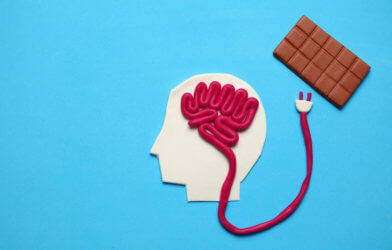Beer bellies and love handles are never fun to look at in the mirror. But new research reveals hidden fat depots padding abdominal organs could accelerate brain aging, especially in men vulnerable to Alzheimer’s disease.
Analyzing over 200 healthy volunteers using MRI scans, scientists at Rutgers University discovered higher levels of fat squirreled away in the liver, pancreas and bellies correlated with shrunken brain volumes and lower scores on cognitive tests like memory and processing speed.
Intriguingly though, these brain-shrinking effects from spare tires only showed up significantly in males and not females of similar ages, despite comparable amounts of hidden abdominal obesity overall between the sexes.
The results published in the journal Obesity add to clues that body fat influences dementia risk and brain health in complex, sex-dependent ways as we get older.
“Our findings indicate stronger correlations compared to the relationships between BMI and cognition, suggesting that abdominal fat depots, rather than BMI, is a risk factor for lower cognitive functioning and higher dementia risk,” explains lead author Sapir Golan Shekhtman, a PhD student at Sheba Medical Center in Israel, in a statement.
Rather than overall weight as measured crudely by BMI, the distribution of padding in specific areas like encasing abdominal organs reflects accumulation of inflammatory visceral fat. Autopsies consistently find obese people harbor more Alzheimer’s-linked protein clumps like amyloid-beta plaques compared to lean individuals upon death.
Connecting Belly Fat To Brain Health
The Rutgers team decided to zoom in on people already facing higher genetic odds for Alzheimer’s in midlife. Of the 204 volunteers with an average age of about 60, each had at least one parent diagnosed with sporadic Alzheimer’s dementia. About 60% were female.
None showed cognitive impairments during testing themselves, but researchers could examine early subtle impacts fat deposits and sex differences might have on resilient brain networks.
MRI scans quantified liver, pancreas and abdominal fat around each participant’s organs. Compared to recordings of youthful brains as benchmarks, male volunteers on average showed significantly less gray matter volume in important memory regions like the hippocampus by middle age. Gray matter in females declined less drastically.
Importantly however, while both men and women carried fairly equal amounts of hidden belly fat, only overweight males exhibited shrinking in structures critical for attention, learning and emotion control tied to their specifically excess pancreatic and liver fat.
More abdominal organ padding in men also meant scoring worse on cognitive tests and surveys of executive functioning essential for daily life activities like paying bills or medications management. No such brain-behavior links emerged among women.

“In middle-aged males at high Alzheimer’s disease risk but not females, higher pancreatic fat was associated with lower cognition and brain volumes, suggesting a potential sex-specific link between distinct abdominal fat with brain health,” says senior author Michal Schnaider Beeri, who directs the brain institute’s Krieger Klein Center for Neurodegeneration and dementia prevention research.
What biology underlies this male susceptibility? Researchers suggest that women’s protective effect likely stems from estrogen influencing fat storage patterns and offsetting inflammation – a protein-clogging process thought to drive Alzheimer’s pathology over decades.
“Our research highlights the importance of investigating the interrelationships of fat depots, brain aging and cognition in the context of sex differences,” stresses Beeri. “It opens new avenues for targeted interventions and further exploration of sex-specific approaches.”
Future studies should examine a cohort over time to clarify cause-and-effect relationships between midlife weight gain and cognitive decline. But the takeaway remains clear: however annoying love handles feel aesthetically by middle age, they pose complex risks for the aging brain in ways we are just appreciating, especially in men. Maintaining healthy metabolic parameters could pay cognitive dividends down the road.
So while BMI offers a convenient snapshot raising health awareness generally, understanding exact fat distribution and resulting biological impacts will prove key for more meaningful precision medicine interventions, the Rutgers scientists conclude. Mapping amounts padding specific organs over 50 may motivate more men to spare their gray matter by shedding excess pounds.












